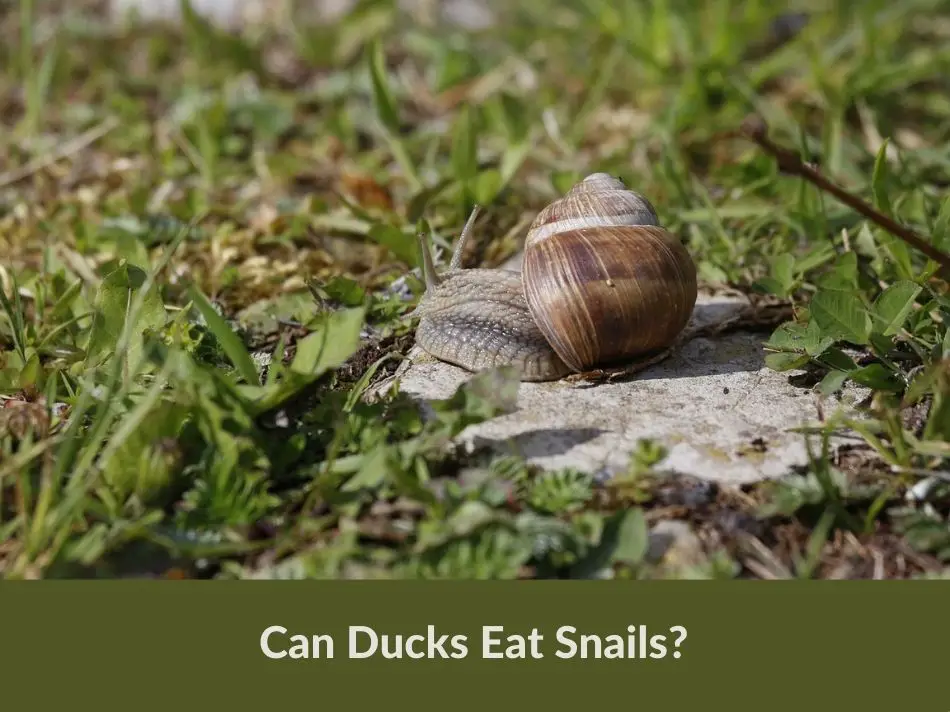Ducks, those ever-charming birds often found waddling by ponds and lakes, have a diverse diet that ranges from aquatic plants to small animals. Anyone who has raised ducks or observed them in the wild will note their curiosity and high appetite. But, can ducks eat snails?
Yes, ducks can eat snails. Both in the wild and domestic settings, snails serve as a rich source of nutrients for ducks. In natural environments, it’s not uncommon to see ducks dabbling at the water’s edge or even diving underwater, hunting for these mollusks.
In this article, we explore the dietary relationship between ducks and snails, delving into the natural feeding behaviors of ducks and the nutritional benefits snails offer. We also address potential risks associated with feeding snails to domesticated ducks.
How Often Can I Feed My Ducks Snails?
While ducks naturally consume snails when they encounter them, caretakers should provide them as a treat rather than a staple. If you’re supplementing your duck’s diet with snails, offering them a few times a week should suffice.
Remember, a diversified diet is key to a duck’s health. So, alongside snails, make sure they get their fill of other nutrients too.
Can Ducklings Eat Snails?
Yes, but with caution. While adult ducks can manage larger snails, ducklings might struggle with them. It’s advisable to provide ducklings with smaller snails, ensuring they can consume them without the risk of choking.
As they grow and develop their foraging skills, they’ll naturally graduate to larger snails.
Are Snails Healthy for Ducks?
Snails are indeed a healthy snack for ducks. Rich in protein, calcium, and essential minerals, snails contribute to muscle development, bone strength, and overall growth. Especially for female ducks, the calcium derived from snails is invaluable for eggshell formation.
However, the health benefits are contingent upon the snails being sourced from clean, pesticide-free environments.
Risks Associated With Feeding Ducks Snails
While snails are a natural part of a duck’s diet, there are some potential concerns for those thinking about feeding snails to domesticated ducks:
- Parasites: Wild snails can sometimes carry parasites which might be harmful to ducks if ingested. Lungworm is a notable concern. If you’re sourcing snails from your garden or elsewhere, ensure they come from a clean, pesticide-free environment and consider consulting a veterinarian for guidance on potential risks.
- Pesticides and Chemicals: Snails that have ingested pesticides or other chemicals pose a risk to ducks. Always ensure that any snails you offer to ducks have not been exposed to harmful substances.
- Size of Snail: Larger snails might be more challenging for younger ducks or smaller duck breeds to eat. While ducks are typically adept at breaking down food, it’s best to offer snails that can be easily consumed.
How To Feed Snails To Ducks
- Introduction: Begin by gradually introducing snails into your duck’s diet to monitor their reactions and preferences.
- Size Matters: Start with smaller snails, especially if introducing them to ducklings, to avoid any risk of choking.
- Source Matters: Ensure the snails are sourced from clean, pesticide-free environments. Their health benefits are only as good as their source.
- Always Provide Water: Ensure ducks have access to clean water whenever they’re fed. This aids in their digestion and allows them to comfortably wash down their meal.
More Insects Ducks Can Eat
Insects provide essential protein, making them a nutritious snack option. Whether you’re a farmer, duck caretaker, or simply someone curious about ducks, you might be interested to know which insects are suitable for ducks.
For a closer look at what ducks can eat from the insect world, here are a few:
Remember to view our list of duck-friendly insects.
Conclusion
For caretakers and those frequenting parks with duck inhabitants, understanding a duck’s dietary needs is crucial. Snails, being a natural part of many duck species’ diets, are both safe and nutritious when offered in moderation.
However, the emphasis should always be on ensuring these mollusks are free from harmful chemicals or parasites.
Disclaimer: The information in this article is for informational purposes only. I'm not an expert or a veterinarian.

